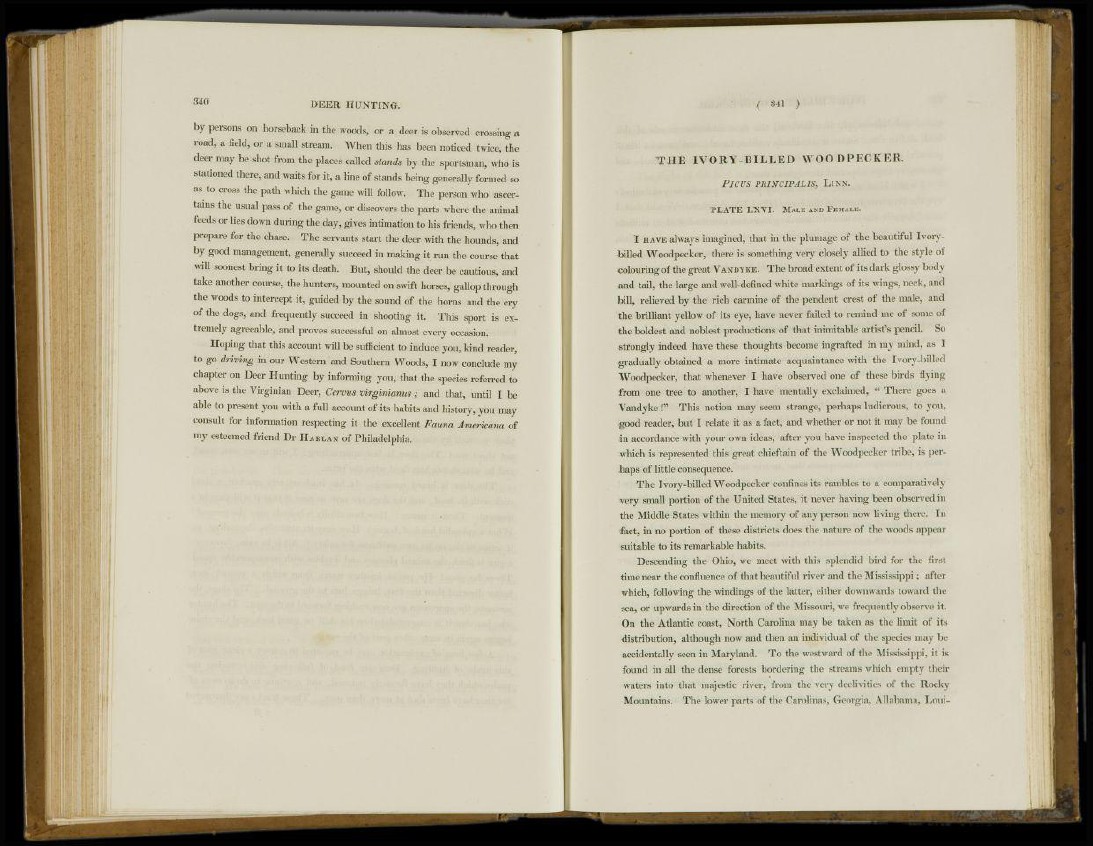
340 DEER HUNTING.
by persons on horseback in the woods, or a deer is observed crossing a
road, a field, or a small stream. When this has been noticed twice, the
deer may be shot from the places called stands by the sportsman, who is
stationed there, and waits for it, a fine of stands being generally formed so
as to cross the path which the game will follow. The person who ascertains
the usual pass of the game, or discovers the parts where the animal
feeds or lies down during the day, gives intimation to his friends, who then
prepare for the chase. The servants start the deer with the hounds, and
by good management, generally succeed in making it run the course that
will soonest bring it to its death. But, should the deer be cautious, and
take another course, the hunters, mounted on swift horses, gallop through
the woods to intercept it, guided by the sound of the horns and the cry
of the dogs, and frequently succeed in shooting it. This sport is extremely
agreeable, and proves successful on almost every occasion.
Hoping that this account will be sufficient to induce you, kind reader,
to go driving in our Western and Southern Woods, I now conclude my
chapter on Deer Hunting by informing you, that the species referred to
above is the Virginian Deer, Cervus virginianus; and that, until I be
able to present you with a full account of its habits and history, you may
considt for information respecting it the excellent Fauna Americana of
my esteemed friend Dr HARLAN of Philadelphia.
( 341 )
T H E I V O R Y - B I L L E D W O O D P E C K E R .
Pic us PRINCIPALIS, LINN.
P L A T E L X V I . MALE AND FEMALE.
I HAVE always imagined, that in the plumage of the beautiful Ivorybilled
Woodpecker, there is something very closely allied to the style of
colouring of the great VANDYKE. The broad extent of its dark glossy body
and tail, the large and well-defined white markings of its wings, neck, and
bill, relieved by the rich carmine of the pendent crest of the male, and
the brilliant yellow of its eye, have never failed to remind me of some of
the boldest and noblest productions of that inimitable artist's pencil. So
strongly indeed have these thoughts become ingrafted in my mind, as I
gradually obtained a more intimate acquaintance with the Ivory-billed
Woodpecker, that whenever I have observed one of these birds flying
from one tree to another, I have mentally exclaimed, " There goes a
Vandyke !" This notion may seem strange, perhaps ludicrous, to you,
good reader, but I relate it as a fact, and whether or not it may be found
in accordance with your own ideas, after you have inspected the plate in
which is represented this great chieftain of the Woodpecker tribe, is perhaps
of little consequence.
The Ivory-billed Woodpecker confines its rambles to a comparatively
very small portion of the United States, it never having been observed in
the Middle States within the memory of any person now living there. In
fact, in no portion of these districts does the nature of the woods appear
suitable to its remarkable habits.
Descending the Ohio, we meet with this splendid bird for the first
time near the confluence of that beautiful river and the Mississippi; after
which, following the windings of the latter, either downwards toward the
sea, or upwards in the direction of the Missouri, we frequently observe it.
On the Atlantic coast, North Carolina may be taken as the limit of its
distribution, although now and then an individual of the species may be
accidentally seen in Maryland. To the westward of the Mississippi, it is
found in all the dense forests bordering the streams which empty their
waters into that majestic river, from the very declivities of the Rocky
Mountains. The lower parts of the Carolinas, Georgia, Allabama, Loui